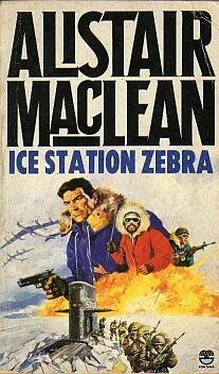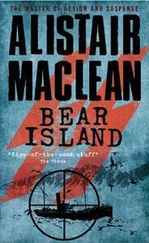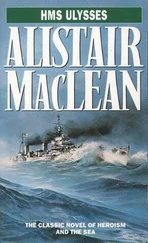Alistair MacLean - Ice Station Zebra
Здесь есть возможность читать онлайн «Alistair MacLean - Ice Station Zebra» — ознакомительный отрывок электронной книги совершенно бесплатно, а после прочтения отрывка купить полную версию. В некоторых случаях можно слушать аудио, скачать через торрент в формате fb2 и присутствует краткое содержание. Год выпуска: 1963, Жанр: Триллер, Боевик, на английском языке. Описание произведения, (предисловие) а так же отзывы посетителей доступны на портале библиотеки ЛибКат.
- Название:Ice Station Zebra
- Автор:
- Жанр:
- Год:1963
- ISBN:нет данных
- Рейтинг книги:3 / 5. Голосов: 1
-
Избранное:Добавить в избранное
- Отзывы:
-
Ваша оценка:
- 60
- 1
- 2
- 3
- 4
- 5
Ice Station Zebra: краткое содержание, описание и аннотация
Предлагаем к чтению аннотацию, описание, краткое содержание или предисловие (зависит от того, что написал сам автор книги «Ice Station Zebra»). Если вы не нашли необходимую информацию о книге — напишите в комментариях, мы постараемся отыскать её.
Ice Station Zebra — читать онлайн ознакомительный отрывок
Ниже представлен текст книги, разбитый по страницам. Система сохранения места последней прочитанной страницы, позволяет с удобством читать онлайн бесплатно книгу «Ice Station Zebra», без необходимости каждый раз заново искать на чём Вы остановились. Поставьте закладку, и сможете в любой момент перейти на страницу, на которой закончили чтение.
Интервал:
Закладка:
"More air," Swanson said.
I braced myself, one hand on the plot, the other on an overhead grab bar. On the screen, the ice was rushing down to meet us. Suddenly the picture quivered and danced, the «Dolphin» shuddered, jarred, and echoed hollowly along its length, more lights went out, the picture came back on the screen, the sail was still lodged below the ice, then the «Dolphin» trembled and lurched and the deck pressed against our feet like an ascending elevator. The sail on the TV vanished, nothing but opaque white taking its place. The diving officer, his voice high with strain that had not yet found relief, called out, "Forty feet, forty feet." We had broken through.
"There you are, now," Swanson said mildly. "All it needed was a little perseverance." I looked at the short, plump figure, the round, good-humored face, and wondered for the hundredth time why the nerveless iron men of this world so very seldom look the part.
I let my pride have a holiday. I took my handkerchief from my pocket, wiped my face, and said to Swanson, "Does this sort of thing go on all the time?"
"Fortunately, perhaps, no," he smiled. He turned to the diving officer. "We've got our foothold on this rock. Let's make sure we have a good belay."
For a few seconds, more compressed air was bled into the tanks, then the diving officer said: "No chance of her dropping down now, Captain."
"Up periscope."
Again the long, gleaming silver tube hissed up from its well. Swanson didn't even bother folding down the hinged handles. He peered briefly into the eyepiece, then straightened. "Down periscope."
"Pretty cold up top?" Hansen asked.
Swanson nodded. "Water on the lens must have frozen solid as soon as it hit that air. Can't see a thing." He turned to the diving officer. "Steady at forty?"
"Guaranteed. And all the buoyancy we'll ever want."
"Fair enough." Swanson looked at the quartermaster, who was shrugging his way into a heavy sheepskin coat. "How about a little fresh air, Ellis?"
"Right away, sir." Ellis buttoned his coat and added: "Might take some time."
"I don't think so," Swanson said. "You may find the bridge and hatchways jammed with broken ice but I doubt it. My guess is that that ice is so thick that it will have fractured into very large sections and fallen outside clear of the bridge."
I felt my ears pop with the sudden pressure change as the hatch swung up and open and snapped back against its standing latch. Another, more distant sound as the second hatch cover locked open, and then we heard Ellis on the voice tube.
"All clear up top."
"Raise the antennae," Swanson said. "John, have them start transmitting and keep transmitting until their fingers fall off. Here we are and here we stay — until we raise Drift Ice Station Zebra."
"If there's anyone left alive there," I said.
"There's that, of course," Swanson said. He couldn't look at me. "There's always that."
4
This, I thought, death's dreadful conception of a dreadful world, must have been what had chilled the hearts and souls of our far-off Nordic ancestors when life's last tide slowly ebbed and they had tortured their failing minds with fearful imaginings of a bleak and bitter hell of eternal cold. But it had been all right for the old boys, all they had to do was imagine it, we had to experience the reality of it, and I bad no doubt at all in my mind as to which was easier. The latter-day Eastern conception of hell was altogether more comfortable, at least a man could keep reasonably warm there.
One thing sure, nobody could keep reasonably warm where Rawlings and I were, standing a half-hour watch on the bridge of the «Dolphin» and slowly freezing solid. It had been my own fault entirely that our teeth were chattering like frenzied castanets. Half an hour after the radio room had started transmitting on Drift Ice Station Zebra's wave length and all without the slightest whisper by way of reply or acknowledgment, I had suggested to Commander Swanson that Zebra might possibly be able to hear us without having sufficient power to send a reply but that they might just conceivably let us have an acknowledgment some other way. I'd pointed out that drift stations habitually carried rockets — the only way to guide home any lost members of the party if radio communication broke down — and radio sondes and rockoons. The sondes were -radio-carrying balloons that could rise to a height of twenty miles to gather weather information; the rockoons, radio rockets fired from balloons, could rise even higher. On a moonlit night such as this, those balloons, if released, would be visible at least twenty miles away: if flares were attached to them, at twice that distance. Swanson had seen my point, called for volunteers for the first watch, and in the circumstances I hadn't had much choice. Rawlings bad offered to accompany me.
It was a landscape — if such a bleak, barren, and, featureless desolation could be called a landscape — from another and ancient world, weird and strange and oddly frightening. There were no clouds in the sky, but there were no stars, either: this I could not understand. Low on the southern horizon a milky, misty moon shed its mysterious light over the dark lifelessness of the polar ice cap. Dark, not white. One would have expected moonlit ice to shine and sparkle and glitter with the light of a million crystal chandeliers: but it was dark. The moon was so low in the sky that the dominating color on the ice cap came from the blackness of the long shadows cast by the fantastically ridged and hummocked ice; and where the moon did strike directly, the ice had been so scoured and abraded by the assaults of a thousand ice storms that it had lost almost all its ability to reflect light of any kind.
This ridged and hummocked ice cap had a strange quality of elusiveness, of impermanence, of evanescence: one moment there, definitively hard and harsh and repellent in its coldly contrasting blacks and whites; the next, ghost-like, blurring coalescing and finally vanishing like a shimmering mirage fading and dying in some ice-bound desert. But this was no trick of the eye or imagination; it was the result of a ground-level ice storm that rose and swirled and subsided at the dictates of an icy wind that was never less than strong and sometimes gusted up to gale force, a wind that drove before it a swirling rushing fog of billions of needle-pointed ice spicules. For the most part, standing as we were on the bridge twenty feet above the level of the ice — the rest of the «Dolphin» might never have existed, as far as the eye could tell — we were above this billowing ground swell of ice particles — but occasionally the wind gusted strongly, and the spicules lifted, drummed demoniacally against the already ice-sheathed starboard side of the sail, drove against the few exposed inches of our skin with all the painfully stinging impact of a sand blaster held at arm's length. But, unlike a sand blaster, the pain-filled shock of those spear-tipped spicules was only momentary; each wasp-like sting carried with it its own ice-cold anesthetic, and all surface sensation was quickly lost. Then the wind would drop, the furious rattling on the sail would fade and in the momentary contrast of nearsilence we could hear the stealthy rustling as of a million rats advancing as the ice spicules brushed their blind way across the iron-hard surface of the polar cap. The bridge thermometer stood at — 21°F — 530 of frost. If I were a promoter interested in developing a summer holiday resort, I thought, I wouldn't pay very much attention to this place.
Rawlings and I stamped our feet, flailed our arms across our chests, shivered non-stop, took what little shelter we could from the canvas wind-break, rubbed our goggles constantly to keep them clear, and never once, except when the ice spicules drove into our faces, stopped examining every quarter of the horizon. Somewhere out there on those frozen wastes was a lost and dying group of men whose lives might depend upon so little a thing as the momentary misting-up of our goggles. We stared out over those shifting ice sands until our eyes ached. But that was all we had for it: just aching eyes. We saw nothing, nothing at all. The ice cap remained empty of all signs of life. Dead.
Читать дальшеИнтервал:
Закладка:
Похожие книги на «Ice Station Zebra»
Представляем Вашему вниманию похожие книги на «Ice Station Zebra» списком для выбора. Мы отобрали схожую по названию и смыслу литературу в надежде предоставить читателям больше вариантов отыскать новые, интересные, ещё непрочитанные произведения.
Обсуждение, отзывы о книге «Ice Station Zebra» и просто собственные мнения читателей. Оставьте ваши комментарии, напишите, что Вы думаете о произведении, его смысле или главных героях. Укажите что конкретно понравилось, а что нет, и почему Вы так считаете.












